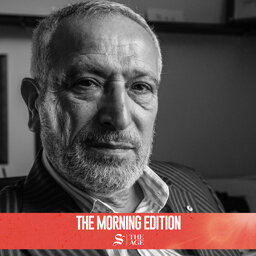What do Trump's tariffs mean for Australia?
American president Donald Trump announced this morning that he would issue a 10 per cent tariff on all Australian exports to the US, and he singled out Australia's main export beef, saying our current trade relationship on the product was unfair.
Today, we bring you a bonus mini episode with international editor Peter harcher on what these tariffs mean for us and what might come next
In 2 playlist(s)
The Morning Edition
The Morning Edition brings you the story behind the story with the best journalists in Australia. Jo…Social links
Follow podcast
Recent clips

Tim Wilson accused the treasurer of pouring fuel on the inflation flames – is he right?
28:54

What Ukraine’s four-year resistance against Russia teaches us about survival
24:38

Inside Dr Jamal Rifi's mission to bring 'ISIS brides' and children home
33:17
 The Morning Edition
The Morning Edition
